
“Am I A Jerk For Refusing To Take My Girlfriend To Nice Places Because She Eats Like A Kid?”
When I was a kid, I was a connoisseur of chicken tenders. Adventurous eating just didn’t appeal to me until I was a teen, but once we reach adulthood, most of us graduate from the kids menu to more mature choices. However, not everyone decides to expand their palate as they get older, and according to one man on Reddit, his girlfriend’s picky eating has caused some issues. Below, you’ll find a post that he recently shared on the “Am I the Jerk?” subreddit wondering if he was wrong for refusing to take his girlfriend to any more nice restaurants, as well as an interview with Registered Dietitian Kinga Balogh.
This man is fed up with his girlfriend’s picky eating habits
Image credits: Athena (not the actual photo)
And when he refused to pay for meals at fancy restaurants any longer, she didn’t take the news too well
Image credits: Israel Albornoz (not the actual photo)
Image credits: Timur Weber (not the actual photo)
Image credits: ATotalMunch
Image credits: Tima Miroshnichenko (not the actual photo)
“Everybody has food preferences and varying degrees of adventurousness around trying out new flavors”
To gain more insight on the topic of picky eating, we reached out to JM Nutrition‘s Registered Dietitian, Kinga Balogh, who specializes in nutritional counselling for eating disorders and disordered eating. Kinga was kind enough to have a conversation with Bored Panda about how common picky eating is among adults. “Everybody has food preferences and varying degrees of adventurousness around trying out new flavors. There is no single definition for ‘picky eating’, however experts agree that selective eating involves strong preferences, rigidity around choices, limited food options and/or fear to try new foods,” Kinga explained.
“Several behaviors can characterize a ‘picky eater’, including refusal to eat specific foods, refusal to eat entire food groups, denial to eat foods that are a certain color/texture/mouthfeel and unwillingness to try new foods,” she continued. “According to the Journal of the American Dietetic Association, a study identified that anywhere from 12-50% of toddlers are picky eaters, based on eating patterns described by their caregivers. Picky eating develops mostly during the toddler years for two main reasons. After experiencing very rapid growth in infancy, by 12 months toddlers’ growth rates and appetite starts to slow down, so their interest in food decreases as they become little explorers. Secondly, toddlers are also trying to establish a sense of independence. What better way, than refusing certain foods, and noticing their caregivers’ often desperate attempts to feed them?”
Kinga also noted that some mental health conditions, such as autism, obsessive compulsive disorder (OCD), and attention deficit hyperactivity disorder (ADHD) can cause picky eating. “If a caregiver suspects that their child demonstrates this constellation of signs and symptoms, it is worthwhile to seek the help of a medical professional to investigate it further,” she says.
“While there is a wealth of studies looking at feeding behaviors in children, the literature does not offer such a plethora of information around adults,” Kinga told Bored Panda. “According to the International Journal of Behavioral Nutrition and Physical Activity, the prevalence of picky eating is around 15-35% across the lifespan, arguably predominantly affecting individuals in the earlier part of their life.”
We also asked Kinga at what point we should be concerned about someone with picky eating habits. “It is important to note that picky eating is a restrictive eating pattern,” she says. “Most selective eaters may meet diagnostic criteria under for an eating disordered called Avoidant/Restrictive Food Intake Disorder (ARFID). Individuals of any age can be diagnosed with this eating disorder. While picky eating can lead to family conflict and power struggles around mealtimes, those affected by ARFID have even more serious consequences to face. Affected individuals are often underweight, have nutritional deficits and severe social anxiety around gatherings and events where food is served.”
“Unlike with other eating disorders, individuals with ARFID are not attempting to manipulate their food intake in hopes of optimizing their body shape or weight,” Kinga explained. “Rather, they demonstrate a genuine disinterest and avoidance of various foods. Additionally, people may avoid eating certain foods out of fear of becoming sick or choking on food. Nevertheless, individuals affected by picky eating or full-blown ARFID can experience unhealthy weight loss and malnourishment from not consuming adequate amounts of food and/or not achieving balance and variety in their eating patterns.”
Regardless of the exact type or restrictive eating adults engage in, Kinga says it’s important to pay attention to the impact on nutritional status and psychosocial functioning. “Depending on the duration and severity of picky eating, one can anticipate significant nutritional challenges, including deficiencies and possibly malnutrition,” she noted. “Also, depending on the rigidity and selectiveness of eating behaviors, one can foresee a significant decline in their quality of life. Folks may feel shame, guilt, and anxiety around their eating habits. As a result, they may decline social engagements or become less present when sharing foods with others due to food preoccupation. This can have a detrimental impact on their mental health and the quality of their relationships.”
Image credits: Alena Darmel (not the actual photo)
“Proceeding with lots of compassion and patience is critical if one truly desires to see lasting change in eating behaviors”
We also asked Kinga if she could share some advice for how we can help picky friends or family members expand their culinary palates. “Expansion of food choices beyond nutritional adequacy is not clinically warranted. It is important to acknowledge that people are fairly set in their tolerance and interest to expand their palate, and this should be respected,” she told Bored Panda. “While the well meaning support of friends and family can go a long way, one needs to be patient, tactful and creative in how they approach such delicate situations.”
She shared some strategies that we should avoid implementing, such as pushing food on children or adults with selective eating patterns. “The resulting anxiety to comply and try unwanted foods can backfire, as this emotion has an appetite suppressing effect,” Kinga explained. “Also, picky eaters may perceive these attempts as intrusive or as an attack to their sense of self.” Enticing or rewarding strategies tend to fail too, Kinga says, due to the fact that they may replicate the ineffective approaches faced by picky eaters from their childhood. “If adult selective eating originates from childhood, the attempt of loved ones to bribe them to eat certain foods may come across as condescending or outright patronizing.”
When it comes to strategies that actually do work, Kinga notes that a multidisciplinary approach may be needed to address picky eating concerns, as they may be caused by a variety of factors. “Seeking the help of a Registered Dietitian and Mental Health Professional specializing in eating disorders can be a great step,” she shared. “Working with a medical professional, to diagnose and treat co-occurring conditions, such as eating disorders, mental health disorders or delayed growth in the pediatric population is also warranted.”
“A Registered Dietitian, like myself can help investigate the origins of picky eating, summarize the characteristics, and evaluate the impact on nutritional status and overall well being,” Kinga told Bored Panda. “Such a holistic assessment will then set the groundwork for collaboratively developing a care plan with the affected client to help remedy the situation.”
“According to Ellyn Satter, Family Therapist and Registered Dietitian specializing in eating competence and food peace, the process of increasing food variety for extremely selective eaters often takes years. She warns: ‘Trying to speed up the process will slow it down’. I would agree that proceeding with lots of compassion and patience is critical if one truly desires to see lasting change in eating behaviors,” Kinga added.
Image credits: Vanessa Loring (not the actual photo)
“Genetics, childhood feeding patterns and/or disordered eating behaviors may be at play”
Exposure therapy and systematic desensitization under the guidance of a Registered Dietician can also be effective with many picky eaters. “This can be done with multiple foods, in the hopes of eventually expanding food repertories primarily to remedy nutritional deficiencies,” Kinga noted, adding that mental health professionals can help selective eaters by the use of therapeutic modalities such as cognitive behavioral therapy (CBT) and/or dialectic behavioral therapy (DBT). “These therapies give affected individuals tools and coping strategies to listen to their bodies, as opposed to feel overtaken by anxiety-provoking thoughts pertaining to previously avoided foods.”
“Back in food chemistry, we learned that foods contain tens to hundreds of volatile compounds that determine their aroma and flavor,” Kinga told Bored Panda. “Depending on one’s genetics, the same food can be perceived differently by two individuals. While one person may enjoy the taste of cilantro, another person may find it soapy. It is important to keep this in mind, when feeling frustrated or resisting the urge to pressure others to take delight in the same foods that bring us joy.”
“Sometimes we develop more liking for certain foods the more exposure we get to them. Perhaps, the first sampling of dragon fruit was not a win, however upon further exposure one can notice the crisp and seedy texture and develop a deeper affinity for this exotic fruit,” she continued. “Considering these observations, let’s tread gently when trying to bring others onboard with expanding their palate. Genetics, childhood feeding patterns and/or disordered eating behaviors may be at play, which in turn significantly influencing one’s ability to diversity their food choices.”
We would love to hear your thoughts on this story in the comments below, pandas. Do you think this man should accept his partner for her picky palate, or do you think he was right to put his foot down? Feel free to share, and then if you’re interested in checking out another Bored Panda article discussing picky eating, look no further than right here. And if you’d like to gain more insight from the experts on picky eating or anything nutrition related, be sure to visit JM Nutrition’s website right here.
Invested readers began asking for more information on the situation
Some sided with the boyfriend, agreeing that there’s no reason to take his partner to nice restaurants
While others thought that he could have handled the situation more delicately
Why on Earth is he embarrassed? One commenter said it right; they wouldn't have it on the menu if they'd have a problem with serving it to people. It's not like restaurants would keep tabs on the guests like "here's the tender chicken chick, she's going to order it for the 27th time this autumn" If he has a problem with it, he should ask her to pay for her part. I pretty much am like; don't look into my plate, concentrate on yours, end of story!
Most restaurants like those he mentioned have it on the menu for the kids. Heck, some of them will only serve to children. I have watched adults get told "sorry, you have to be under 12 to order those".
Load More Replies...I suck at making chicken tenders at home, some restaurant tenders are soooo good. That being said, I'm the person who goes to a steak house & gets chicken or a salad, or to a sushi resturant & gets the noodle bowl. I don't care for steak or sushi, but my husband does. I like other exotic foods, I love Thai & Indian, husband is only okay with it. We go out to dinner to restaurants the other wants to eat at and will both find something we will be happy eating, even if it's chicken tenders. The girlfriend wants the dining experience not necessarily the strangest food on the menu. Why does it matter so much? Cant you just enjoy the evening & the company you have with eachother?
for some reason the way OP put it to me it sounded like she wouldn't even try the food he got. He didn't say it explicitly but it sounds like that to me. I don't really think either of them are TA but if she really was unwilling to try it like my head says might be happening then I'd be more on OPs side. If she's willing to try the food he orders but is more comfortable with ordering something she knows she'll like then I think that's perfectly fine. And I agree that it should just be about enjoying the company
Load More Replies...This reminds me of the restaurant that I work at. It’s known for its great fresh caught seafood and specialty dishes. Five middle aged adults came in this past week and all of them ordered grilled cheese sandwiches with fries off the kids menu. Just why? I mean, go to Dennys or other diner.
Why do you care what other adults are eating for dinner? Literally has no effect on your life.
Load More Replies...Why on Earth is he embarrassed? One commenter said it right; they wouldn't have it on the menu if they'd have a problem with serving it to people. It's not like restaurants would keep tabs on the guests like "here's the tender chicken chick, she's going to order it for the 27th time this autumn" If he has a problem with it, he should ask her to pay for her part. I pretty much am like; don't look into my plate, concentrate on yours, end of story!
Most restaurants like those he mentioned have it on the menu for the kids. Heck, some of them will only serve to children. I have watched adults get told "sorry, you have to be under 12 to order those".
Load More Replies...I suck at making chicken tenders at home, some restaurant tenders are soooo good. That being said, I'm the person who goes to a steak house & gets chicken or a salad, or to a sushi resturant & gets the noodle bowl. I don't care for steak or sushi, but my husband does. I like other exotic foods, I love Thai & Indian, husband is only okay with it. We go out to dinner to restaurants the other wants to eat at and will both find something we will be happy eating, even if it's chicken tenders. The girlfriend wants the dining experience not necessarily the strangest food on the menu. Why does it matter so much? Cant you just enjoy the evening & the company you have with eachother?
for some reason the way OP put it to me it sounded like she wouldn't even try the food he got. He didn't say it explicitly but it sounds like that to me. I don't really think either of them are TA but if she really was unwilling to try it like my head says might be happening then I'd be more on OPs side. If she's willing to try the food he orders but is more comfortable with ordering something she knows she'll like then I think that's perfectly fine. And I agree that it should just be about enjoying the company
Load More Replies...This reminds me of the restaurant that I work at. It’s known for its great fresh caught seafood and specialty dishes. Five middle aged adults came in this past week and all of them ordered grilled cheese sandwiches with fries off the kids menu. Just why? I mean, go to Dennys or other diner.
Why do you care what other adults are eating for dinner? Literally has no effect on your life.
Load More Replies...
 Dark Mode
Dark Mode 

 No fees, cancel anytime
No fees, cancel anytime 








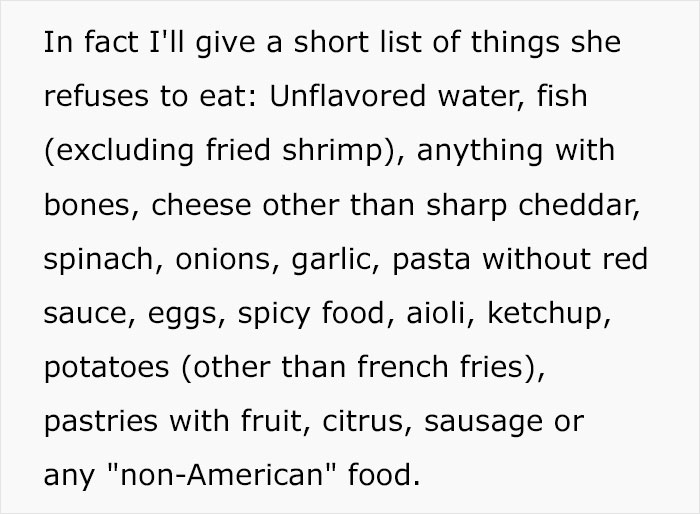


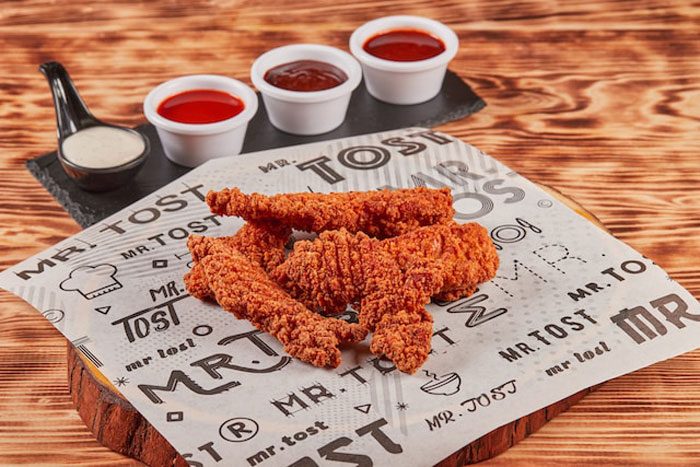












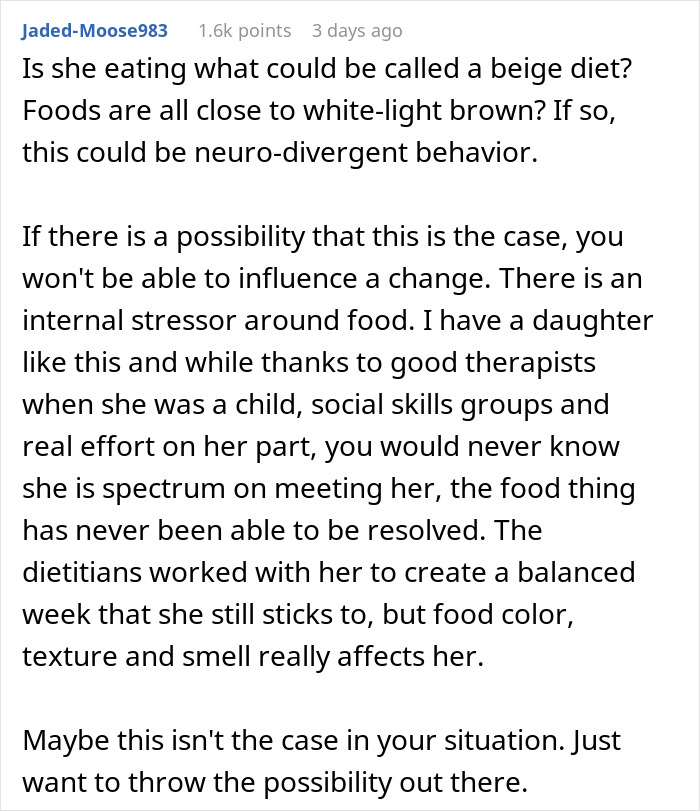
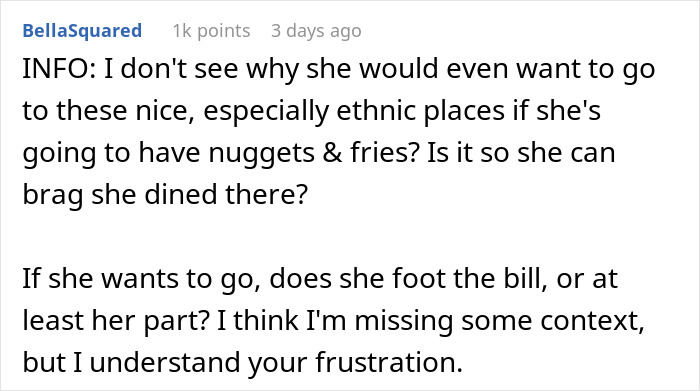

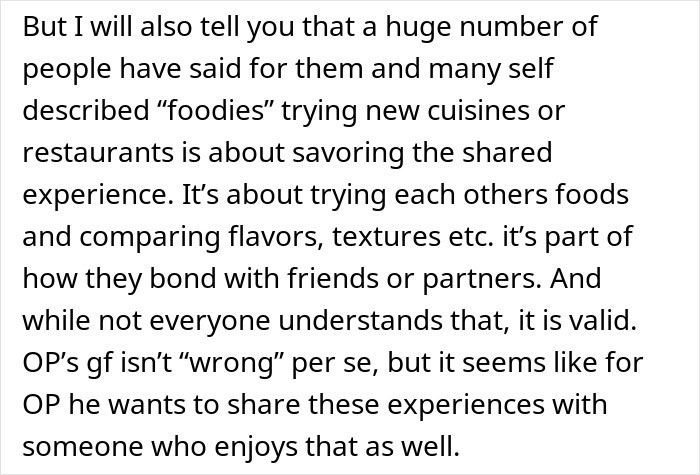

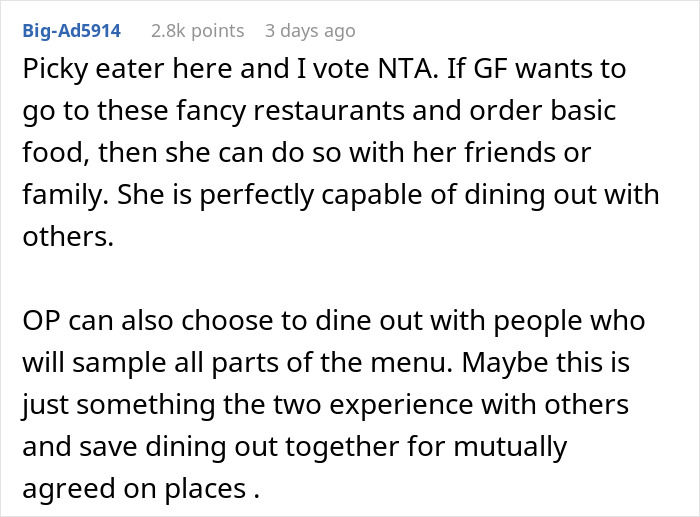



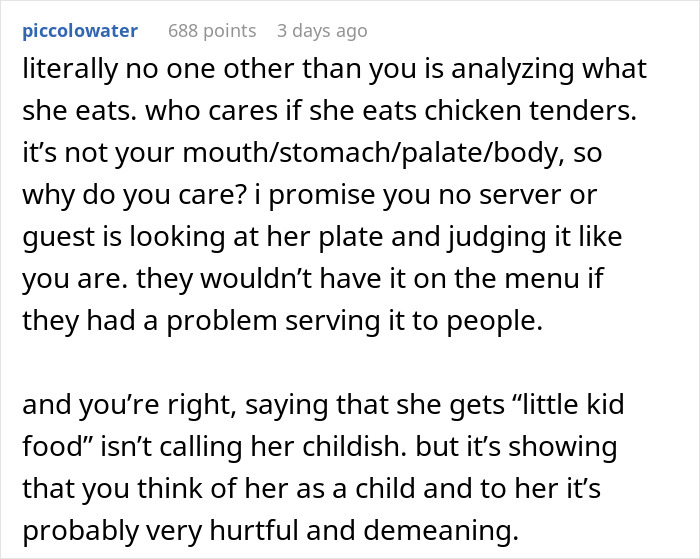












































43
153